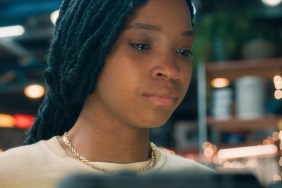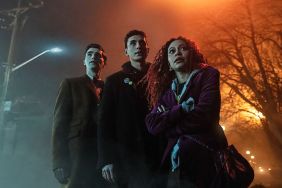After winning an Oscar for co-writing the screenplay for his directorial debut Crash, which also won Best Picture that year, Paul Haggis tackled the topic of soldiers returning home from Iraq in In the Valley of Elah, a movie that had troubles finding an audience despite its all-star cast.
With The Next Three Days, Haggis switches gears into the realm of action thriller while retaining his strong sense of character and drama from his previous films. Based on the French thriller Pour Elle, the movie stars Russell Crowe as John Brennan, an English teacher in Pittsburgh whose wife Lara (Elizabeth Banks) is convicted of murdering her female boss shortly after an altercation. Convinced his wife is innocent, John begins planning a way to break her out of the high-security jail in which she’s being kept. Using all of the resources available to him, John finds himself delving into some fairly illegal areas while trying to put together the perfect escape plan for his wife.
ComingSoon.net had a chance to sit down with Paul Haggis for a casual interview early in the morning before facing the press masses at the film’s New York press conference.
ComingSoon.net: The first question you’re going to get and probably the most obvious one is about the French film that this is based on, because as far as I know, it was never even released here.
Paul Haggis: It was a small French film. My head of development, Eugenie Grandval, she’s Parisienne, she found it for me, and sent it to Michael Nozick, my producing partner, and I, as something that our company would like to produce, because we have several films we have worked with other directors and writers. I saw it and said, “I’d like to do this film.” They went, “What?” I said, “I’d like to do this film.” I think they thought of me as someone who mostly did dramas about social and political issues, and I said, “No, I’ve wanted to do a thriller my entire life.” I grew up on the Hitchcock films. I grew up in the ’70s on things like “Three Days of the Condor,” and things with very personal stakes involving romance with a suspense thriller, or in this case, a caper film. People think it’s a suspense thriller, but I was told it’s a caper format, because it’s a long slow build, climbing until 40 minutes of bat out of hell action, but it’s not a thriller. I guess we start right away with some kind of personal jeopardy, and somebody’s got a knife and sneaking up on you, but I really loved the themes of this small picture, and I thought this was something that I could take and dig into some of the questions they asked, and to deepen those questions and to come up with my own answers for them, and then hopefully make it a little more exciting as well.
CS: It definitely has aspects of a drama, where you spent time building the relationships between the characters. I haven’t seen the original movie, but that caper aspect in it and did it play out in a similar way?
Haggis: What I did was I started with my own questions and how a school teacher, which is very similar to a writer, how would I go about this? I started with that and I said, “Well, I’d go online and I’d start doing research.” That’s what he does, and so I did. I went online and I found the answers – everything he finds, I found online. I recreated them, because for copyright reasons, we couldn’t show their tennis ball video and their bump key, but I found them. So I found all those things and then tested them and saw how they worked. Then decided where I wanted to shoot it, which was Pittsburgh because geographically, it fit for me, and also it talked about the themes that I wanted to talk about, because it’s a city that transformed itself from a steel town to this town that is really about education and art and medical. I wanted a two-generation story. I wanted this sort of John Wayne-like father who would’ve been a steel worker, this guy who you look at and go, “Well, Brian Dennehy, he’ll break his wife outta prison. There’s no question.” Then you look at his son, which was a guy like us, right? He’s not from that generation anymore. We are teachers, and writers and we you have to question your own masculinity and wonder, “Could we do this?” So, that’s what the town gave me, so I wanted to do it there. I went there and I went to the jail and they opened the jail to me and they showed me the jail and they showed me how people had tried to break out and how they failed. There’s only three people that had escaped – three people that attempted and no one made it out alive. They’d have someone try to get in the elevator with a key and went, “Ah, okay, I’ll try that.” So, I created the story as I went, and then I walked outside and said, “Okay, they get out here, where do they go?” Now, I just started plotting it. I go, “Okay, if they get on the train here, they’re gonna stop in the train station here. How will they get off?” So, I literally went through the whole thing in a couple of days, and then realized that everything that was difficult, you had planned to the last detail, to what coat you wear, but it was the things you take for granted that would go wrong. It’s where you drop off your son, and then no one can pick him up. So that was all different than the French film, although the structure was the same, but there were many questions that they didn’t ask. He never had to choose between his wife and his son. There weren’t a lot of failures. I decided to go up and have this long plot line, and then, no, it gets nowhere. Start it over.
CS: Having done all that research, how dangerous is it to have a movie that people can watch and think, “Okay, it’s not that hard to break out of prison after all”?
Haggis: Yeah, well, it’s not something I’d recommend because no one has made it out alive out of this jail, okay? (laughs) And they have tried these ways. It’s always a question you ask yourself when you’re doing research and putting it on a film, you have a responsibility to the audience not to let people know how to break into your homes. Unfortunately, all this stuff is already online. (Laughs) If you just Google “How to break into a car,” you’ll find that video. What I don’t say, for example, is that the tennis ball (trick), it only works on certain model cars, yeah.

CS: I wanted to talk about the casting, because I think I read that Russell Crowe was kind of very much in mind as the lead. I don’t know if it was while you were writing it.
Haggis: No, that’s incorrect. I try and never think of anyone when I’m writing because it’s like, you start to write for what that actor’s done before and you’re doing it an actual great disservice.
CS: If you don’t get them of course, then you’re stuck.
Haggis: Yeah, exactly. No, I push them out of mind and just think of the character. As soon as I finished, I did my short list and Russell Crowe was at the top of that short list, and I didn’t know how to get him. I didn’t know him. I never met the man. I knew I wanted someone who could play an everyman, and I’d seen him do it so beautifully in “A Beautiful Mind,” and “Insider,” not to say those were everymen, but he makes us empathize with a character immediately. I knew that people would forget all about “Gladiator” and “Robin Hood” the moment he walked on the screen, and you do. Five minutes into the movie you go, “Oh, the poor sop. He’ll never be able to pull this off.”
CS: I think he’s a great actor but for some reason he has to fight against people’s preconceptions of him in every single movie, but he’s always so good that he always delivers as far as I’m concerned.
Haggis: Yeah, he’s a brilliant actor. I also wanted an actor who could do so much in so little because so much of this movie is without words. A lot of really important scenes, there’s no dialogue, and all the decisions he makes are without dialogue. “He’s there to see – oh, he just made that change. Oh, he’s gonna go rob a bank.” There’s no dialogue, but we know what he’s doing because it’s film, so you get to see it, and you see it on his face. You see, “Oh my God, I have to do this now. I have no choice.”
CS: What about casting Elizabeth Banks? I think at least the last few years she’s been doing so much comedy and she has such great comic timing, she’s hilarious. This is quite different because it’s a straight dramatic role with no humor at all.
Haggis: I saw her in “W” and I knew she was terrific in that. It was different. It was not a caricature, it was a character that she was playing. It was a real-life character, but I think she did a really good job without falling into mimicry on that movie. Russell and I agreed early on that he’d very much wanted to have someone who’d come to read for this thing and see what the chemistry was like because that worked very well for him on “Beautiful Mind,” so I said, “Great, let’s try it out.” Rather than offering it to a number of the A-list movie stars we were gonna go with, we did that, and she came in and she won the role. So you push aside everything a person’s done when they walk into the room and sit down and start reading. It doesn’t really matter.
CS: One of the most impressive parts of the movie is the highway scene, and though this isn’t an action movie per se, it really was quite impressive.
Haggis: Thank you.
CS: I was curious how you pulled that off and how much you were able to shoot on an actual highway vs. doing stuff with green screen.
Haggis: We shot a bunch of that and then some green screen, so that was a tough, tough sequence.
CS: Were you able to close off a highway to shoot that?
Haggis: Yeah, absolutely, yeah. It was a lotta fun to shoot, and then of course, using the green screen to get all that good stuff that you can’t get with the actors in the vehicle. But Russell did so many of his own stunts, did so much of his own driving in this thing, it was insane. I just started to feel more and more comfortable with him all the time doing so. This was just a small-budget film – this is larger than my last two films, but still, compared to “Unstoppable” or anything, it’s a third of the budget of these things, right? So you try to get people with the same kinda action, which you’ll never do, but you want to have the intensity at least, if you don’t have the 17 cameras. If you only have two, you just don’t have the intensity, our schedule was like half of what theirs is, or any big action movie. I remember one time I said, “Okay, well, we’re losing the night, so, Russell hop in the car, Stefan (my DP, you sit here, I’m going to operate the camera in the back. Take off down there, turn right, turn left, turn right and stop over there by that white car. Just go. It’s all locked up. Drive like a bat outta hell!” So I’m in the back and we’re going like crazy and he turns left, turns right, and we hadn’t driven this route at this speed and I’ve never driven it with Russell. I’ve just sort of watched it. I’d forgotten that there are just so many bumps in this thing, and then so many dips. I’m in the back and I’m watching him driving, watching him driving, and suddenly, this is the scene where he’s driving away from the house when the guy’s shooting him. There’s a bump and he goes down a dip, he goes back up, I go up, my head hits the ceiling, my head comes down, hits the camera casing right off. (Laughs) I tried not to groan, and he’s there, he turns around, looks, and we gotta go, “Cut.” I look and the frame hasn’t moved and I go, “Thank god that was locked up.”

CS: Have you done a lot of your own camerawork before?
Haggis: Well, that’s a locked-up camera. No, I don’t operate my own camera, but this is easy. I wanted to be able to see his performance. I can’t judge a performance unless I see it, you know, be where I’m needed and this is very important, so I’m always in the car if we’re shooting, and usually sometimes I’ll operate it if it’s a very simple, simple thing, if it’s basic.
CS: Did doing this give you the action bug? I know that every director who starts getting into action, gets this bug that makes them want to do even more action.
Haggis: It’s a lotta fun. It’s a lotta fun. Why I like it is because you have to remember to keep the emotional stakes, even if someone is walking across the street, because if they walk across the street and they’re not, so to speak, in the scene, their head isn’t in the scene, if they’re not thinking what the character should be thinking, if they haven’t got those contexts, it doesn’t work. It’s just a man walking down the street, but if they’re haunted by what they’ve just done, or whatever, and they’re walking across the street, it’s beautiful, it speaks, and you could be on a wide-angle lens from on top of the building and watch a man walk across the street and a great actor will be in the moment and you’ll feel for that character even if though it’s such a speck down there.
CS: I think that’s one of the reasons the movie works, and this is more of a compliment than a question, I guess. I think if a younger director did this, it would’ve been very different because they probably would not have been able to build the character since they were so focused on the action.
Haggis: Well, thank you. That’s what made all the difference.
CS: I know you’ve been developing a lot of different projects through your production company, so how many of these have you been developing to direct and how many are you going to try to find other directors for?
Haggis: I really want to work with other directors and other writers, so some projects I’m bringing in to sort of godfather as a producer, some I’d like to maybe write and then hand off to someone else. The problem is when you get something, you’re always like, “What about me? I can do this!” (laughs) The artist in you comes out and goes, “I want to direct that,” but I’m trying to get some really cool projects. I’ve got one that’s a really great script that I wrote. I know when my scripts are bad and my scripts are good, and sometimes my scripts really stink. There’s one good one that I’m gonna hand off to another director. I’ll hopefully have another one fairly soon.
CS: Is it hard to write while you’re making movies? I’ve talked to a lot of writer/directors who when they start directing a movie, they can’t really do anything else.
Haggis: It is, but I started off as a writer, and so I know that anytime I’m not writing, I’m unemployed, so I’m feeling my net work, so I actually started writing a new one last December and I’m almost finished. I’ve been in post this entire time; we just finished two weeks ago.
CS: I read somewhere that you might do something with Russell again, like with “The Equalizer?”
Haggis: I’ve got two projects I’d like to do with him again. We’ll see, you know? You always never know. “The Equalizer” is interesting. Russell brought that to me. It was not something I thought of, but, “Oooo, that can be kinda cool.” Then also, this other thing is a very personal thing, it’s a multi-character piece.
CS: I wouldn’t say you originated the multi-character drama with “Crash,” but whenever someone works in that genre, “Crash” tends to be brought up, either negatively or favorably.
Haggis: I know, either people who love the film or hate the film, exactly.
CS: Exactly, or sometimes I’ll bring it up when a movie doesn’t work as well as “Crash,” which is most of the time. I was curious how you felt about being credited for creating this sub-genre of drama?
Haggis: Well, I certainly didn’t. There were many fabulous foreign films from Inarritu back to Chabrol, and if you look at Altman’s pictures, but I guess the way this particular subgenre that I am associated with is not just multi-characters, it’s one in which one character leads you to the next. So they’re all in a natural connection of some sort that, I guess, is fewer of those films, and I really like that kind of film. It’s something that follows naturally. This next one I’m doing is again, multi-character, but it’s not like that. It’s more traditional. It’s some sort of true stories that somehow interweave, but they don’t interweave in the way that “Crash” did, in a sort of natural way.
CS: I guess people think of you as the originator of the genre because had one of the first really successful multi-character dramas.
Haggis: Yeah, perhaps so.

CS: Were you actually filming in Pittsburgh at the same time as Ed Zwick was doing “Love and Other Drugs” there?
Haggis: Yes, in Pittsburgh at the same time, now we’re doing our junket at the same time and we’re good friends. We go back to “30 Something” together.
CS: Yesterday, he was telling me about how he has a lot of things in development as well and is trying to wait for financing, but also trying to find the right climate for something. I was curious about that. Obviously when “Valley of Elah” came out, I thought it was kind of underrated.
Haggis: Thank you.
CS: It’s possible that Warner Independent did not have things together at the time.
Haggis: They just put no money into it at all.
CS: Right, but some thought it was due to the connections to Iraq, but “The Hurt Locker” comes out and it’s a very different movie, but I was curious about your take on it. Do you generally try to think of what might work in the current climate or not at all?
Haggis: No, no, I never do. I didn’t do it in television, which is why my career in television failed. It was funny because “Easy Streets,” which I did a couple of years before “Sopranos” and at the time, they were saying, “You can’t do a continuing story on television, Paul. You can’t do it.” I was like, “Yeah, yeah, I’m gonna do it.” I did it, and it failed and then four years later, there’s “24.” I guess I’m a bit of a contrarian; I like doing what everyone else is not. So yeah, I don’t try and time my pictures. I knew that “In the Valley of Elah” no one would see, but I knew I had to make it.
CS: I want to ask about some of these other projects you’re developing. I don’t know about the Hugh Masekela project, is that progressing?
Haggis: Yes, we’ve got the writers working on that and Sal Masekala is great and we’re working with him, so yeah.
CS: Then also “Cell 211″…
Haggis: Yes.
CS: That is also another movie that would be a remake?
Haggis: Yes, exactly. Have you seen it?
CS: No, I’ve never seen the original movie of that either.
Haggis: It’s a brilliant film, a brilliant film. It won the Goyas (Spanish equivalent of the Oscars). We found it last January, I saw it, and I was so impressed, and we’ve been negotiating ever since basically. (laughs) We finally tied up the rights like two weeks ago, and we sold it to CBS Films, and I will be writing that and we’ll see if I direct it. I’m not sure. That’s another prison movie, but a very different one, a very brutal, brutal.
CS: Is it a very different doing remakes or adaptations?
Haggis: You know, it is and it isn’t. It has to immediately become your movie. That’s the same thing with “Casino Royale” when I was already starting my book, and then the script. You start and it becomes your movie and I can’t remember anything in there that’s not mine. Of course, there are things. There’s some chase scenes in “Casino Royale” that aren’t mine, like the opening one, but after that… “Million Dollar Baby” was an adaptation. It took me a year to adapt it. It was an adaptation.
CS: You always wonder if it’s harder or easier…
Haggis: Harder. Harder.
CS: But you do have some source material to work from.
Haggis: It’s not always harder, no. In this case, yeah, because you’re trying to take something that works, and then you’re trying to make it your own. In this case, 70 percent of the French film really, really worked incredibly well, and I thought 30 percent was just a little too easy. Then, as soon as you start unraveling it, it’s hard to put it all back together. (laughs) But when you put it back together and it’s seamless, people go, “Well, so you just did another movie.” (laughs)
CS: I really want to try to see the original French movie for this.
Haggis: Oh, there are scenes… there are actual shots that I took directly from that director. It works so well. I can remember two of them. They worked so well and they were so strong, I tried to do it differently and I said, “Nope, he did it better.” You just admit it, so like the opening shot, and a shot right after that, in that same scene later on, exactly what he did.
The Next Three Days opens nationwide on Friday, November 19.









